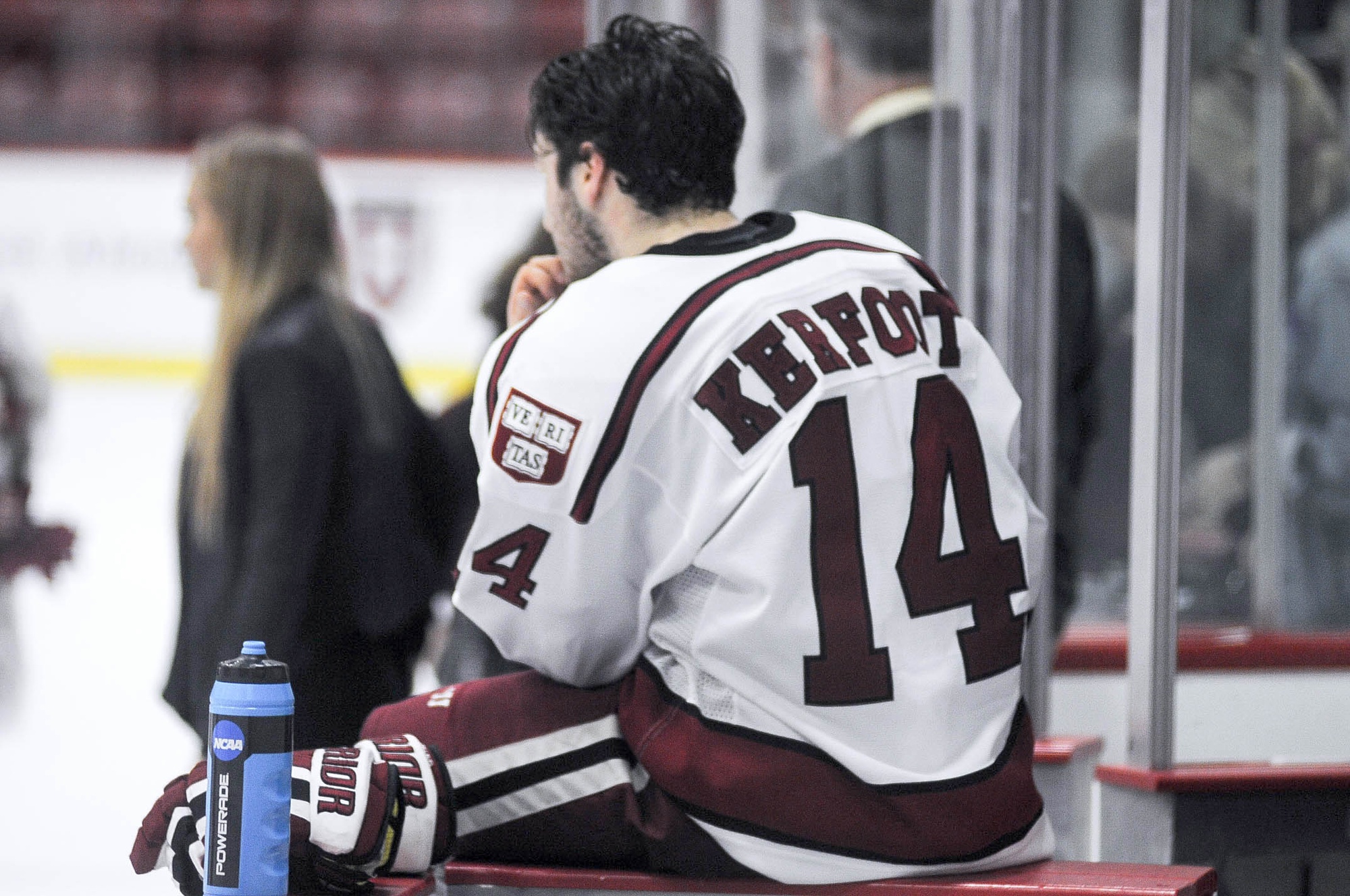
News
Summers Will Not Finish Semester of Teaching as Harvard Investigates Epstein Ties

News
Harvard College Students Report Favoring Divestment from Israel in HUA Survey

News
‘He Should Resign’: Harvard Undergrads Take Hard Line Against Summers Over Epstein Scandal

News
Harvard To Launch New Investigation Into Epstein’s Ties to Summers, Other University Affiliates

News
Harvard Students To Vote on Divestment From Israel in Inaugural HUA Election Survey
Why The Wait for the Ancient Eight?
Some Ivy League regulations just don't work for the men and women who take the ice


Once you flip the calendar to October, it’s time for college hockey. Sure enough, Colgate agrees. A capacity crowd of Raider fans was ready to celebrate the start of the ECAC hockey season at their brand spanking new arena on the first night of the month.
Fast forward. Oct. 7 proved to be another big night for the league, as five different teams were now in action. Most eyes were on defending champion Quinnipiac. Meanwhile, the headlines went to Union, who stunned Michigan in Ann Arbor.
Fast forward to Oct. 14, and then again to Oct. 21. Six ECAC teams had already combined to play 34 games over the first four weekends in October.
As for the other six teams in the conference, they had played none.
Without context, it’s difficult to fathom how anyone could classify a league as fair and balanced when half of its teams get a month-long head start over the rest. That said, the ECAC isn’t at fault. Neither is the National Collegiate Athletic Association.
Blame the Ivy League—where the only ones playing games throughout October are the rulemakers. Under their laws, Ivy League hockey teams are not permitted to play in competition that counts until the fourth Friday prior to Thanksgiving.
Time to fast forward one last time. On Oct. 28—one week prior to the start of the ECAC season for most teams—the shackles were finally lifted from all Ivy skates.
But with one weekend to work with, what kind of game suits an untested team? Playing an opponent with six to eight games under its belt is bound to be dangerous, but throwing the weekend away altogether would be even worse.
“In a perfect world, you would play another Ivy,” Harvard coach Ted Donato ’91 told me. “At least you find somebody that’s got the same set of circumstances.”
But this year, at least for Harvard, that perfect world didn’t exist. In the words of Donato, most of the other Ivies had “already found dance partners." Even Dartmouth—the Crimson’s travel partner—had set up a home game with Michigan (a game the Big Green shockingly won).
So what was Donato’s natural response? Scheduling a weekend slate in the Arizona desert, of course. Harvard spent its first weekend in the Southwest playing Arizona State, the newest member of Division I hockey.
But while Donato won’t say it—no team is to be overlooked, after all—the games might as well have been exhibitions. Sure, they gave the Crimson a chance to shake out some cobwebs, but they certainly didn’t put Harvard to the test.
And now real competition awaits. The Crimson’s conference opener is set for this Friday at the Bright-Landry Hockey Center against Colgate, the team that opened up its new rink on Oct. 1 and now has seven games under its belt.
Contrast those circumstances with those of the Crimson, who not only had to wait until last weekend to play a game, but also had to wait until Oct. 7 to begin practicing.
The nonsensical nature of these rules becomes a topic of conversation at the start of every season. The regulations baffle me year in and year out, but realistically, they shouldn’t. After all, this is the Ivy League—a league unlike any other.
While every league loves to claim that they value academics over athletics, only the Ivy League has turned the mantra into mandate.
From limits on how many players can travel to road games to the lack of games held on weekdays, the Ivy League has crafted all sorts of rules and regulations aimed at minimizing disturbances to academic life for its athletes.
These regulations work when the Ivy League is in control. When everyone plays by the same rules. But when members of the Ivy League go off to play in different conferences like the ECAC, that logic goes out the window. The esteemed Ivy Manual is only hurting its hockey teams, and the legislators of the Ancient Eight need to loosen their grip.
Now, do I expect the rules to ever change? No. After all, the Yale men’s hockey team’s national championship in 2013 likely provided the league with all the evidence it needed to close its ears on the debate for the rest of eternity.
But let’s be honest. Their ears were never open.
—Staff writer Jake Meagher can be reached jake.meagher@thecrimson.com. Follow him on Twitter @MeagherTHC.
Want to keep up with breaking news? Subscribe to our email newsletter.
